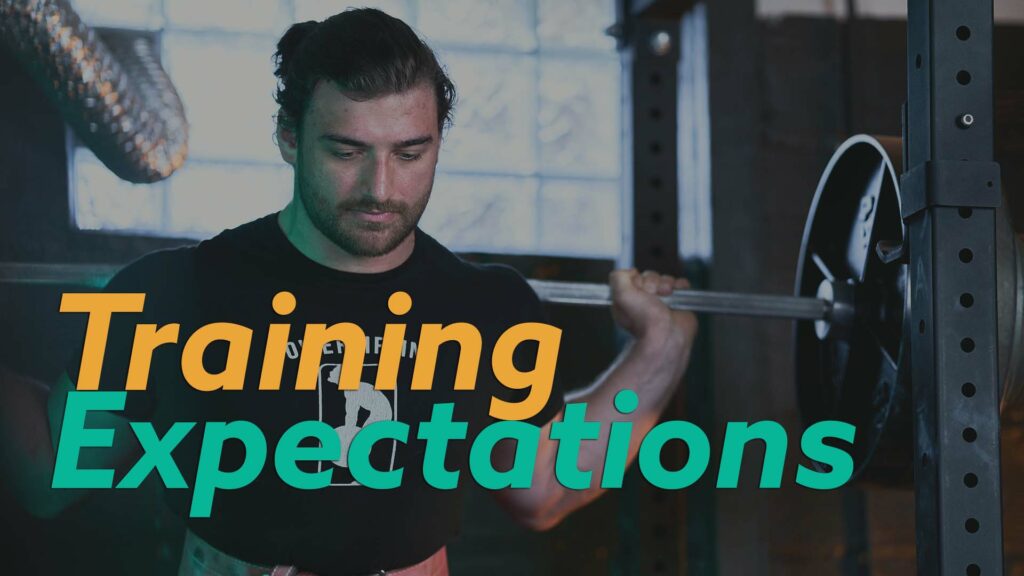Most of us started training because we enjoyed the way it felt on our bodies and enjoyed seeing changes in our mental health and physical appearance.
Unfortunately, for some, the urge to get certain results led to an outcome-focused mindset.
The desire to reach that outcome leads to expectations posed on oneself.
For a lot of people, they end up with pre-training or pre-set anxiety.
This anxiety not only interferes with your long-term training enjoyment but may also decrease your training results over time.
It can go so far that one may ignore severe pain and/or their lack of desire to train. Ending up in a position of burnout and with a lot of injuries.
In many cases, to make the correct decision, one needs information from the present moment.
In order to optimize your workout, your acute biofeedback plays the most important role.
Even for deciding if you should take a day off or continue with your training plan.
Your training expectations interfere the most with your clear recognition of your biofeedback.
If you let go of training expectations, it may enable you to build a more conducive environment to grow.
These expectations could include thoughts like:
– “I need to progress by xyz amount today”
– “I am not allowed to decrease the weight from last week”
– “I am not allowed to pick a different movement, even when I am in pain”
– “I am not allowed to diverge from the plan”
Well, that is easier said than done though.
Letting go of expectations does not mean that you should suppress your desire to hit a certain weight in the gym or to suppress your thoughts about training.
Rather, it is the acceptance that these thoughts are not the ultimate indicator of how you should act in the upcoming training session.
Your actions are based on the present moment.
The decision to act; however, is primarily based on emotions. When we internally emphasize certain expectations leading up to a training session, we remove ourselves from the present moment. Even if we feel a divergence in what our body tells us and what we tell ourselves.
Anxiety in its base structure is the urge to try to shape reality based on our mind and imagination. The bigger the difference between those two, the bigger the anxiety.
Reality is just what it is – you can’t shape it. If your body is in pain, no willpower can make that pain go away. If you are fatigued, no mindset can change that.
You can choose to continue with what you want to do, but you can not force something which is just not there.
The biggest disagreement I’d get with this view is that people state that sometimes you just need to push through something and mentally prepare yourself for a big lift.
These views are not mutually exclusive though. Your body will naturally ramp up focus, excitement, and readiness the more it is needed.
If you go for a PR lift on that day, your body will bring itself to a state capable to perform this lift.
However, adding prior expectations on it does nothing for the lift.
The additional anxiety may make you feel overly nervous, distract you from the things you should focus on, and may cost you the energy you could have used otherwise.
Giving up the need to control the outcome, gives us back a tremendous amount of energy.
The more you go back to look inward during your training sessions, the more it will feel like you are able to choose consciously what is best for you.
You will feel freer, more empowered, less anxious, and more joyful.
Planning in advance is not in contradiction with this type of training. Allowing for flexible adjustments during each training session can give you plenty of clues of how you should adjust your training plan.
Are you fatigued or in pain 24/7? Do you need to adjust all the time based on present biofeedback?
Well, then you should probably change your training stress in favor of more recovery.
If you are noticing that you are overshooting your RPEs all the time, then maybe your body has a higher stress tolerance and you can increase your training stress.
Progression is primarily based on the training stress you can recover from, although we ultimately cannot force progression.
Adding more weight, just because you want to hit a certain number, leads to overshooting your RPE.
If you constantly feel the need to force your training, chances are that you are heading in the wrong direction.
When our expectations put us in a state of unnecessary suffering and we make unfavorable training decisions, we feel drained of energy. And then training fatigue, pain, and slight body aches become even more unbearable.
It feels like an act of self-destruction.
Recognize that training is not easy.
Resistance requires force to overcome it.
The goal instead becomes identifying the difference between productive and counterproductive biofeedback. Note that this will not prevent feelings of fatigue, pain, and achiness.
Instead, we may have an easier time gaining a sense of fulfillment, energy, and content out of the activity.
Try to meet yourself where you are in every single moment. Be with what is and don’t let your past thoughts dictate your decisions in your present moment.

